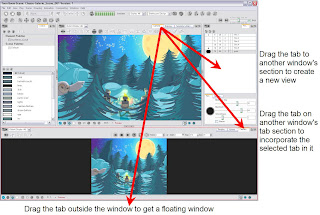Toon Boom Digital Pro Report - Part 2
I am extremely impressed with the quality of documentation for Digital Pro.
In general, the greatest flaw in animation programs, both 2D and 3D is usually with the documentation. Many years ago, I read an article about writing great animation software, particularly 3D software, and it stated the prevailing attitude of the time:
In general, the greatest flaw in animation programs, both 2D and 3D is usually with the documentation. Many years ago, I read an article about writing great animation software, particularly 3D software, and it stated the prevailing attitude of the time:
The programmers spend many intensive hours writing high quality software. Once they finish and have it ready to release to market, somebody says, “Maybe we should put together a manual.” So, the crew breaks out a case of beer and scribbles together a manual the night before the software’s release.
Anyone who used those early programs could easily believe this scenario.

Toon Boom’s documentation, however, is extremely good. Their documentation has represented a major advantage for users. Studio’s documentation, in particular, has really excelled in the past few years.
Solo’s documentation, however, often left out significant areas of explanation. To some extent, I appreciated the gaps, since the two manuals were rather lengthy, even with the gaps. So, even though I complained about the gaps, part of me appreciated that the documentation could become overwhelming if Toon Boom covered every possible topic.
Unfortunately, as I became more comfortable with the program (Solo), I felt that I was missing a lot of the program’s potential.
Digital Pro has greatly expanded the documentation. To keep things reasonable, there is a “basic” guide and then a more intensive guide. There are also hours of video instruction provided.
Clearly, this is a huge improvement with the upgrade. I generally find the documentation to be very readable, even when I am not running the program in front of me.
This is exactly what you need when encountering such a program. It is also what you would expect and should demand with such a high level product. I am thankful Toon Boom has made this investment.

Toon Boom’s documentation, however, is extremely good. Their documentation has represented a major advantage for users. Studio’s documentation, in particular, has really excelled in the past few years.
Solo’s documentation, however, often left out significant areas of explanation. To some extent, I appreciated the gaps, since the two manuals were rather lengthy, even with the gaps. So, even though I complained about the gaps, part of me appreciated that the documentation could become overwhelming if Toon Boom covered every possible topic.
Unfortunately, as I became more comfortable with the program (Solo), I felt that I was missing a lot of the program’s potential.
Digital Pro has greatly expanded the documentation. To keep things reasonable, there is a “basic” guide and then a more intensive guide. There are also hours of video instruction provided.
Clearly, this is a huge improvement with the upgrade. I generally find the documentation to be very readable, even when I am not running the program in front of me.
This is exactly what you need when encountering such a program. It is also what you would expect and should demand with such a high level product. I am thankful Toon Boom has made this investment.



Comments